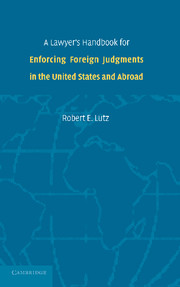Book contents
- Frontmatter
- Contents
- Preface
- Acknowledgments and Dedication
- Introduction
- PART ONE ENFORCING FOREIGN COUNTRY JUDGMENTS IN THE UNITED STATES
- PART TWO ENFORCEMENT OF JUDGMENTS ABROAD
- I Overview
- II How to Identify and Select Foreign Counsel
- III Documentation for Enforcement
- IV Understanding Foreign Enforcement Frameworks
- V Conclusion
- Bibliography
- Instruments, Laws, and Other Materials
- PART THREE THE FUTURE OF ENFORCING FOREIGN JUDGMENTS
- Bibliography
- Index
II - How to Identify and Select Foreign Counsel
Published online by Cambridge University Press: 16 November 2009
- Frontmatter
- Contents
- Preface
- Acknowledgments and Dedication
- Introduction
- PART ONE ENFORCING FOREIGN COUNTRY JUDGMENTS IN THE UNITED STATES
- PART TWO ENFORCEMENT OF JUDGMENTS ABROAD
- I Overview
- II How to Identify and Select Foreign Counsel
- III Documentation for Enforcement
- IV Understanding Foreign Enforcement Frameworks
- V Conclusion
- Bibliography
- Instruments, Laws, and Other Materials
- PART THREE THE FUTURE OF ENFORCING FOREIGN JUDGMENTS
- Bibliography
- Index
Summary
A U.S. lawyer qualified to practice in one or more states is subject to the competency requirement of each state's professional responsibility code. Similarly, lawyers qualified to practice in other countries are also subject to constraints. Therefore, if an attorney seeks enforcement, recognition, and execution abroad of a judgment rendered in a U.S. court, precautions must be taken to avoid possible liability arising from the unlicensed practice of law (“unauthorized practice of law” or UPL). This concern applies both in the United States and abroad. In the United States, approximately half of the states permit an attorney to hire a “foreign legal consultant” (FLC) to advise on the applicable law in the country in which the FLC is licensed to practice law. If an attorney does not engage a foreign legal consultant to render an opinion on the appropriate procedure, the attorney may be subject to discipline or malpractice liability under a state bar's ethical rule of competence. Similarly, if an American attorney does not engage a foreign attorney who is licensed to practice in the appropriate jurisdiction abroad, then the American attorney may be subject to liability under the foreign jurisdiction's prohibition against the unauthorized practice of law. Moreover, the failure to be licensed in the jurisdiction where legal advice is rendered can result in the inability to collect fees or give rise to legal malpractice claims.
Advice: If your client requires representation in a foreign jurisdiction, be sure to either engage a foreign legal consultant (a foreign lawyer who is licensed as a FLC in your jurisdiction), if your state permits, or engage a foreign attorney located in the foreign jurisdiction who is licensed to practice in that jurisdiction.
- Type
- Chapter
- Information
- Publisher: Cambridge University PressPrint publication year: 2006



